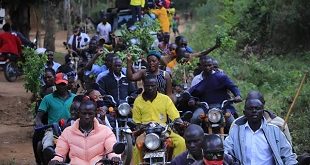
COMMENT | Gertrude Kamya Othieno | The claim made by South African Boers—descendants of Dutch settlers—that they have a legitimate right to the land because they arrived before the Bantu-speaking people reflects a broader colonial mindset that shaped European expansion in both the Americas and Australia. This narrative, often used to justify territorial control, overlooks crucial facts and erases the rich, pre-existing cultures of indigenous populations. A comparison of the Boers’ expansion in South Africa with European colonisation in the Americas and Australia reveals similar patterns of justification and dispossession.
Colonisation as ‘Discovery’
The Boers’ assertion of entitlement to South African lands echoes the mindset of European colonisers who viewed the Americas and Australia as “empty” or terra nullius. This legal concept disregarded the presence of Native Americans and Aboriginal peoples, allowing European settlers to justify their claims. The Boers portrayed their inland expansion during the Great Trek as a pioneering movement into an untamed wilderness, conveniently ignoring the long-established presence of African communities.
Colonisation in North America began with Columbus’s voyages in 1492, while Australia was claimed by the British in 1788. Both were driven by a sense of divine or cultural mission to bring “civilisation” to lands perceived as underused or unowned in the European context. Similarly, the Boers saw themselves as God’s chosen people, entitled to seize land through religious and cultural superiority.
Myth of Prior Arrival
The legitimacy of the Boers’ claim is grounded in a distorted historical timeline. Their assertion that they arrived in South Africa before the Bantu mirrors the belief held by European settlers that they were the first to “discover” the Americas and Australia. This myth was constructed to justify land ownership, despite substantial archaeological and historical evidence proving otherwise.
In reality, Bantu-speaking peoples had been migrating into southern Africa for approximately 1,000 years before the Dutch arrived at the Cape in 1652. During the Boers’ inland movement into regions like the Highveld in the 19th century, they encountered well-established African communities, including the Zulu, Xhosa, and Sotho. This situation parallels European settlers in North America, who faced sophisticated Native American societies, and the British in Australia, where Aboriginal peoples had lived for over 60,000 years before colonisation.
Dispossession and Conflict
Like European settlers in the Americas and Australia, the Boers engaged in violent conflicts with South Africa’s indigenous populations, leading to land dispossession through warfare, forced removals, and unhonoured treaties. In North America, colonisers often waged wars and implemented forced displacement strategies, such as the Trail of Tears, to claim indigenous lands for European agricultural expansion. The British in Australia systematically pushed Aboriginal communities from their ancestral lands.
The Boers, believing themselves entitled to the land, clashed violently with African groups, particularly during events like the Anglo-Zulu War. Their westward expansion was marked by a Calvinist belief in their divine right to the land, mirroring the colonial attitudes of their European counterparts.
Misunderstanding of Land Use and Ownership
A key parallel between the Boers and European settlers lies in differing understandings of land ownership. Indigenous peoples in the Americas, Australia, and South Africa often practised communal land use, managing land collectively rather than adhering to individual ownership. This communal perspective conflicted with the European emphasis on private property.
In South Africa, the Boers introduced European farming methods and established private farms, disregarding the communal and migratory practices of the Khoisan and Bantu peoples. Similarly, European settlers in North America and Australia imposed their property systems on lands traditionally used communally by indigenous groups, reinforcing the idea that these lands were “unclaimed.”
Conclusion
The Boers’ claim to South African land, based on the belief that they were the first inhabitants, follows the same colonial logic that justified European control over the Americas and Australia. In all three cases, the narrative of being the “first” settlers serves to erase the presence of indigenous populations and legitimise conquest. The enduring impact of these colonial ideologies is evident today in ongoing struggles over land rights and historical justice in South Africa, North America, and Australia. Understanding these parallels is crucial for acknowledging the complexities of colonial history and its lasting consequences.
*****
 Gertrude Kamya Othieno | Political Sociologist in Social Development (Alumna – London School of Economics/Political Science) | Email – gkothieno@gmail.com
Gertrude Kamya Othieno | Political Sociologist in Social Development (Alumna – London School of Economics/Political Science) | Email – gkothieno@gmail.com
 The Independent Uganda: You get the Truth we Pay the Price
The Independent Uganda: You get the Truth we Pay the Price



